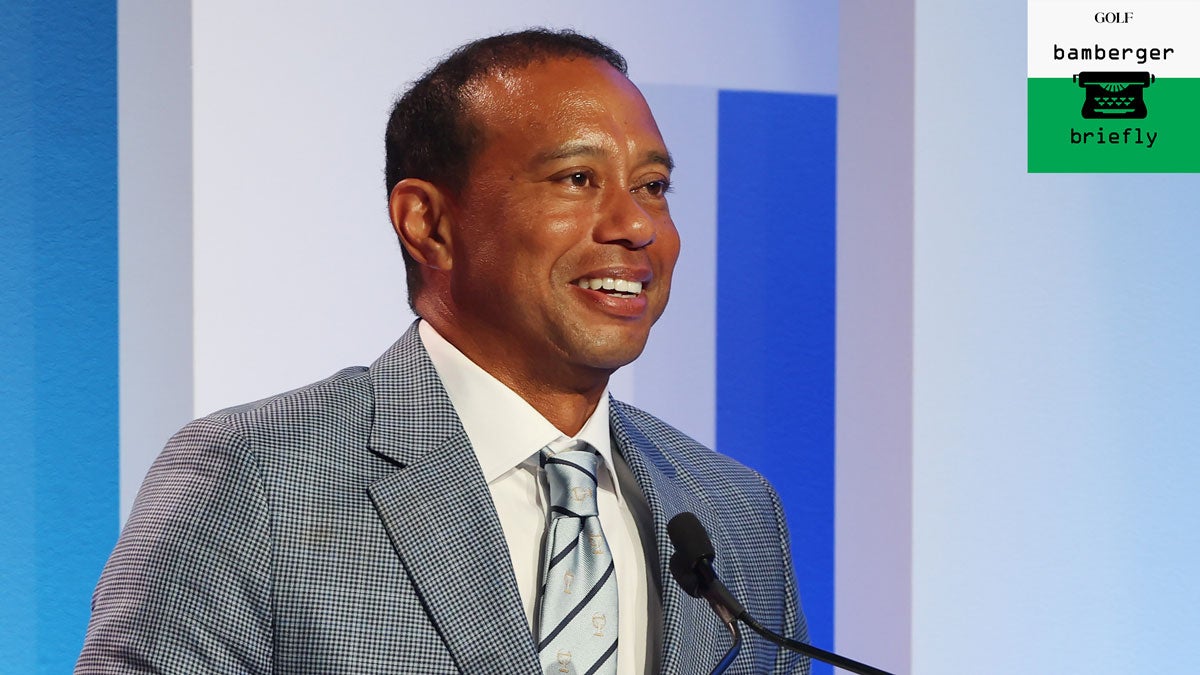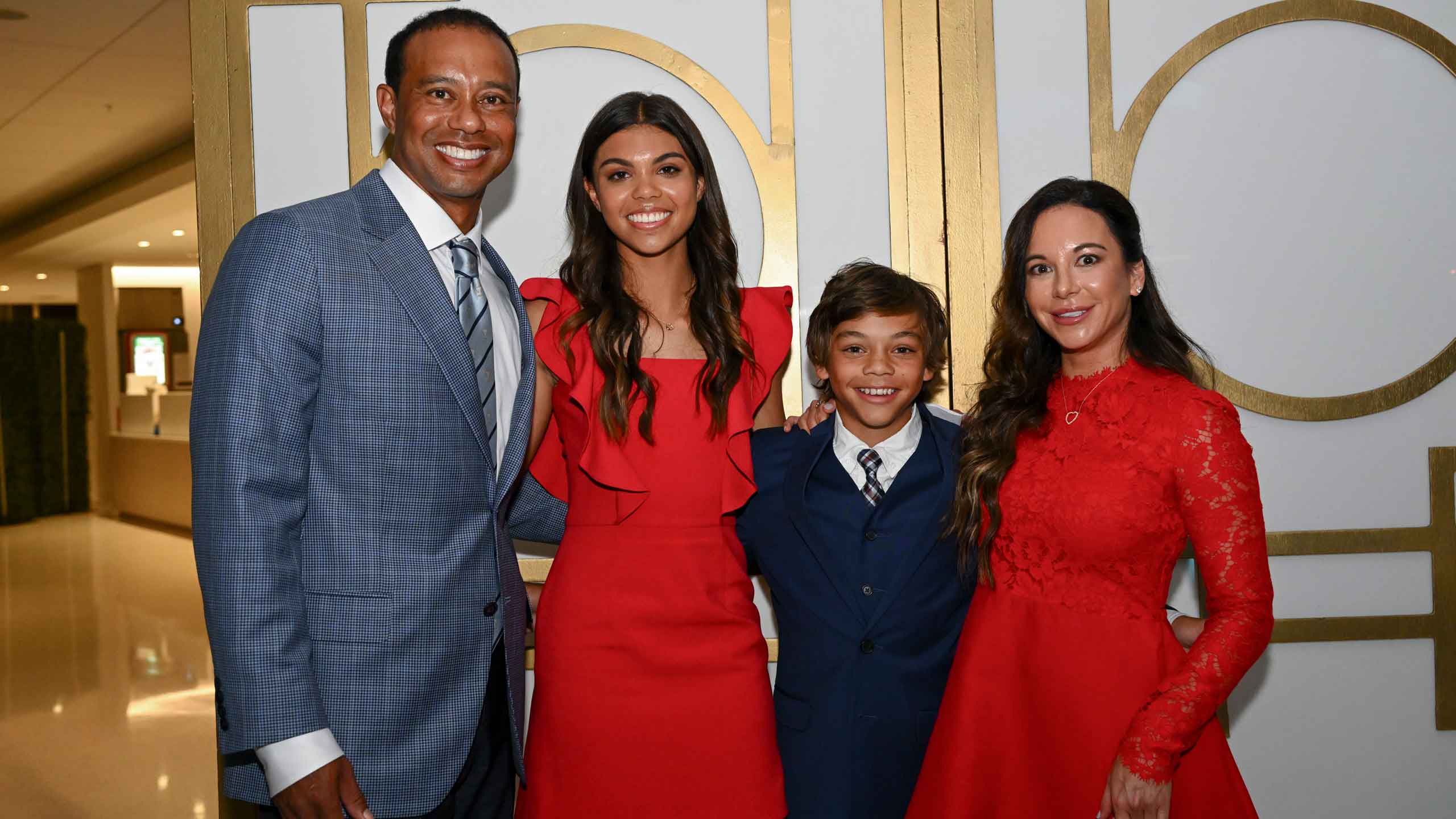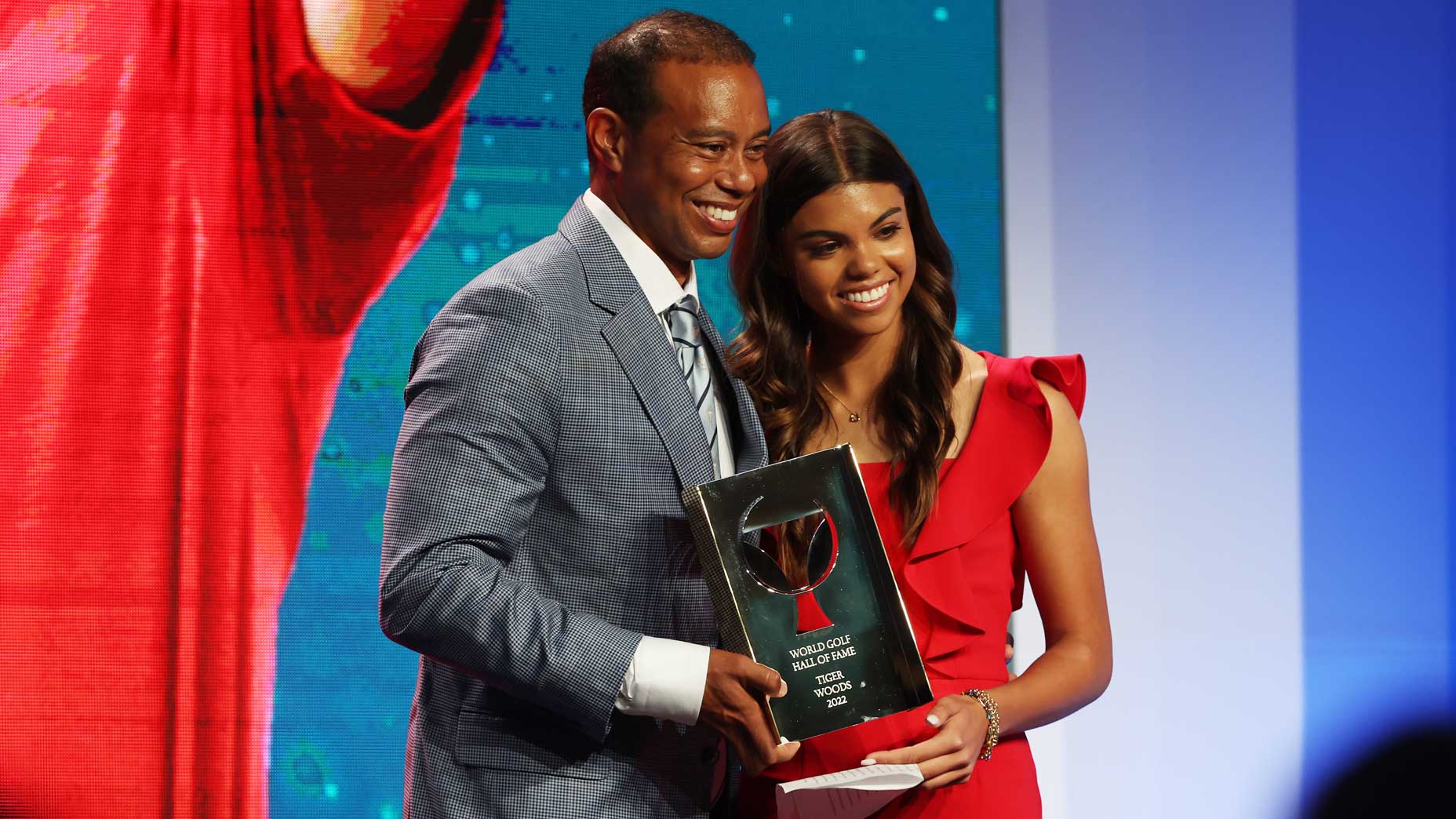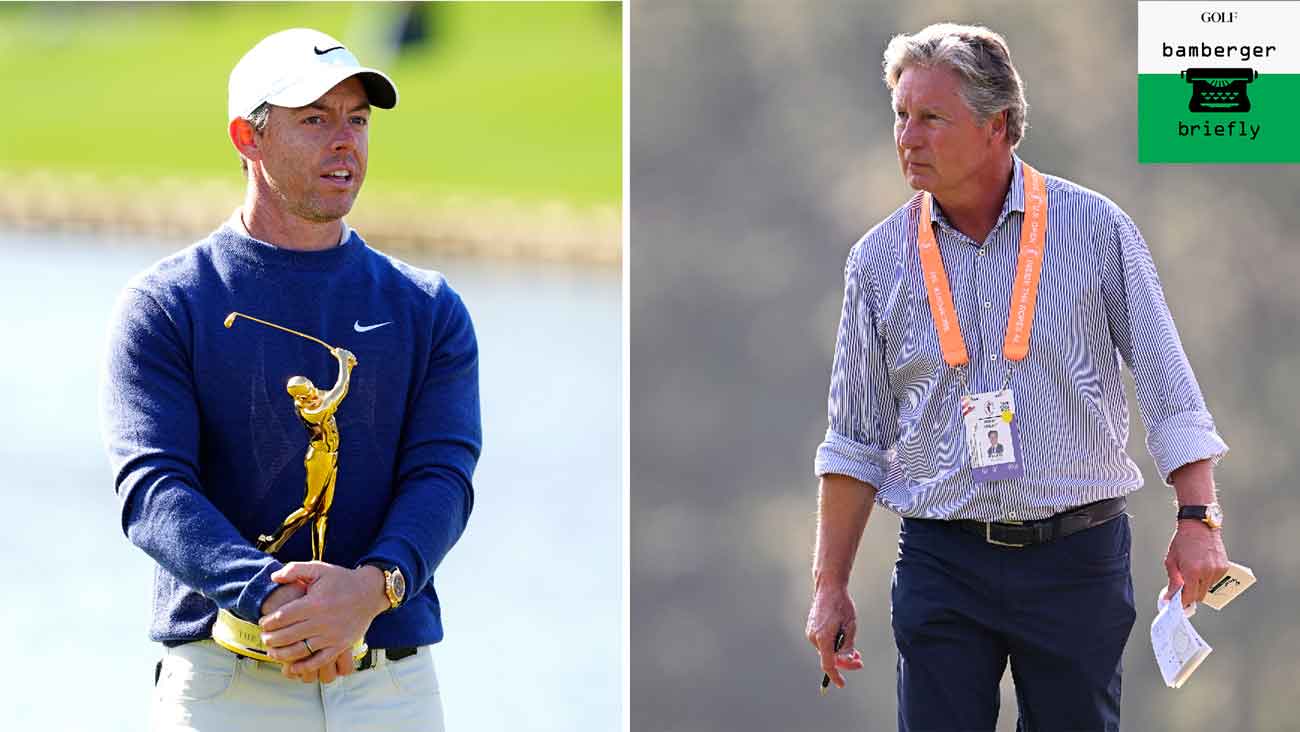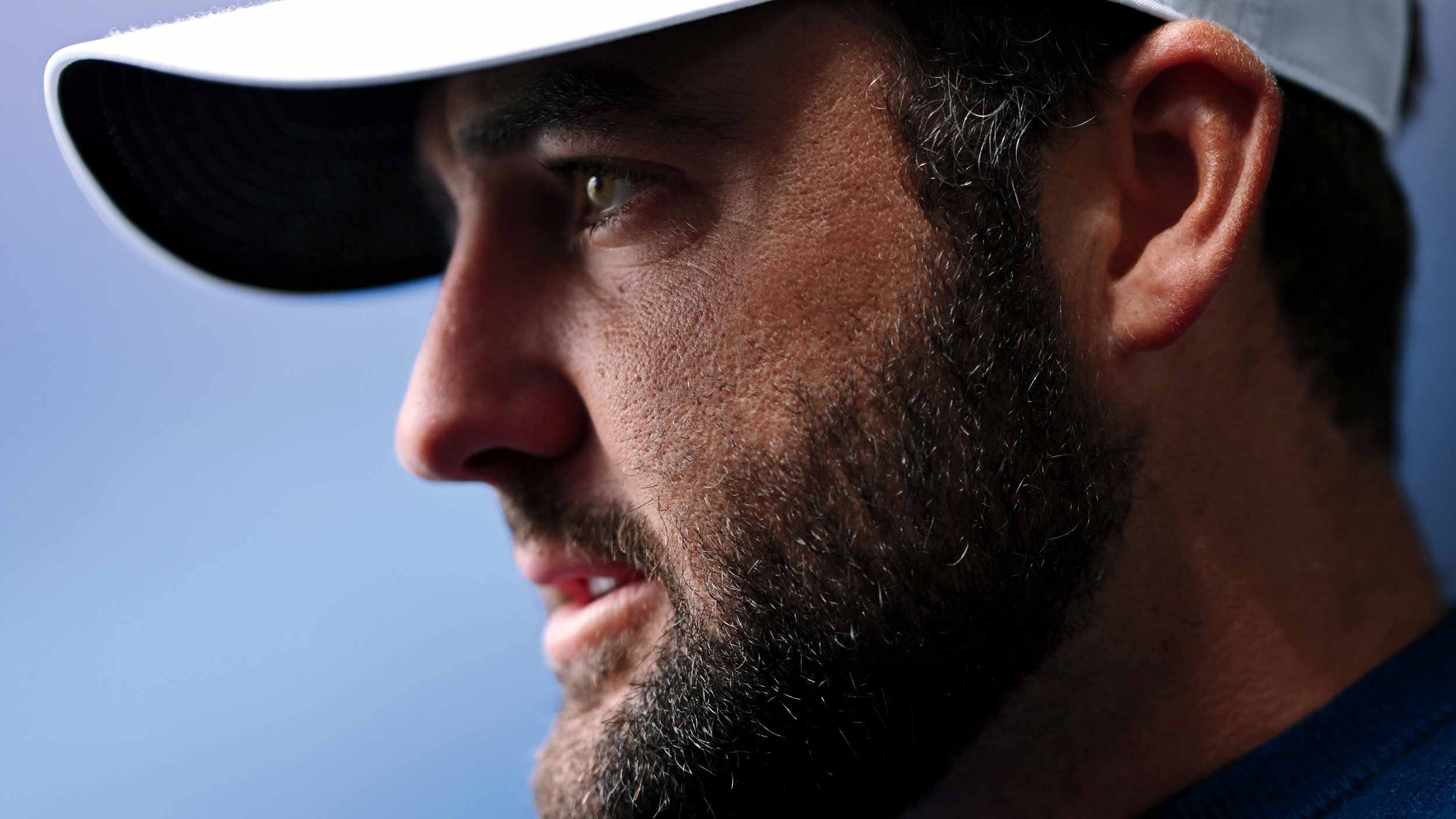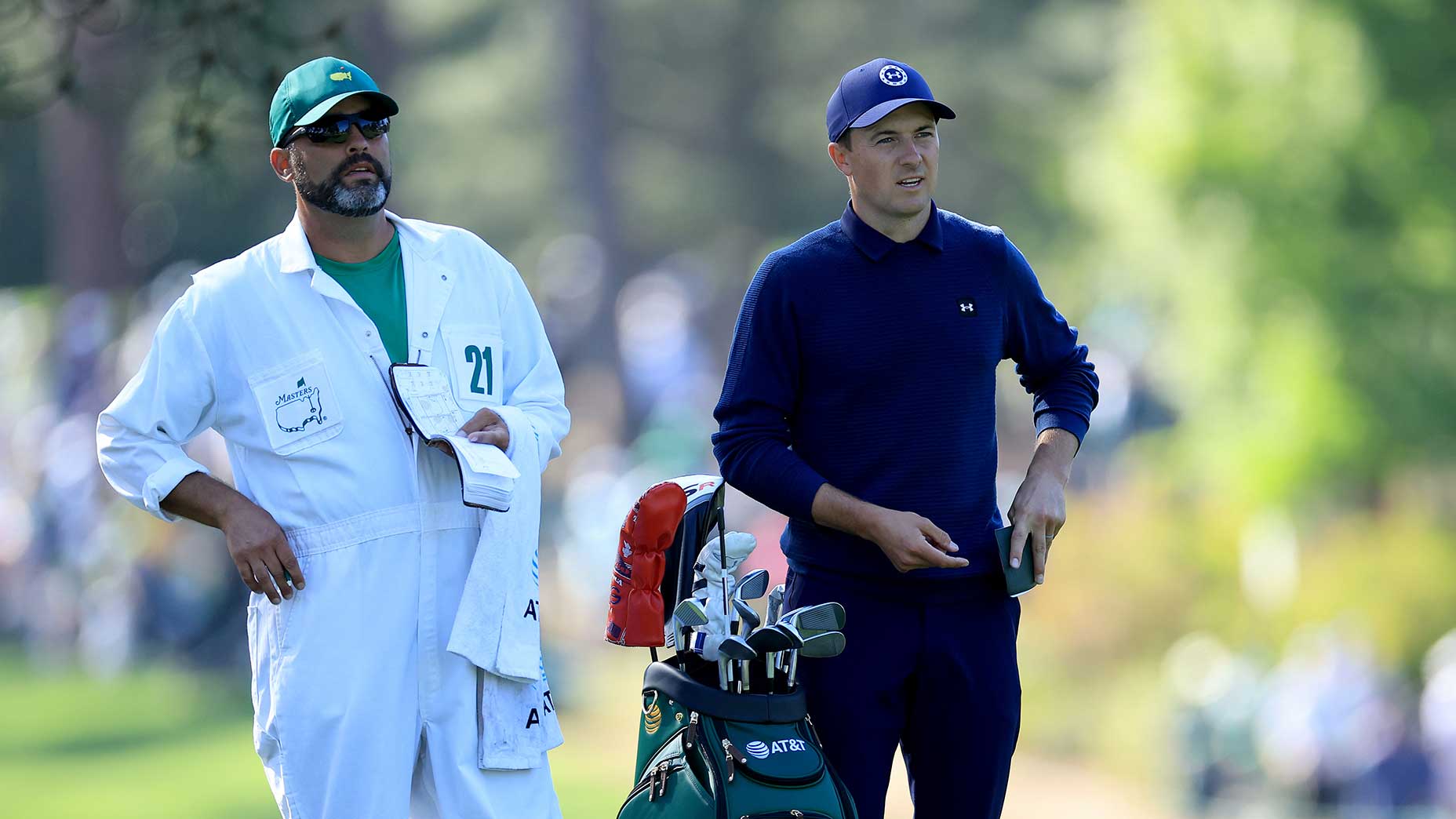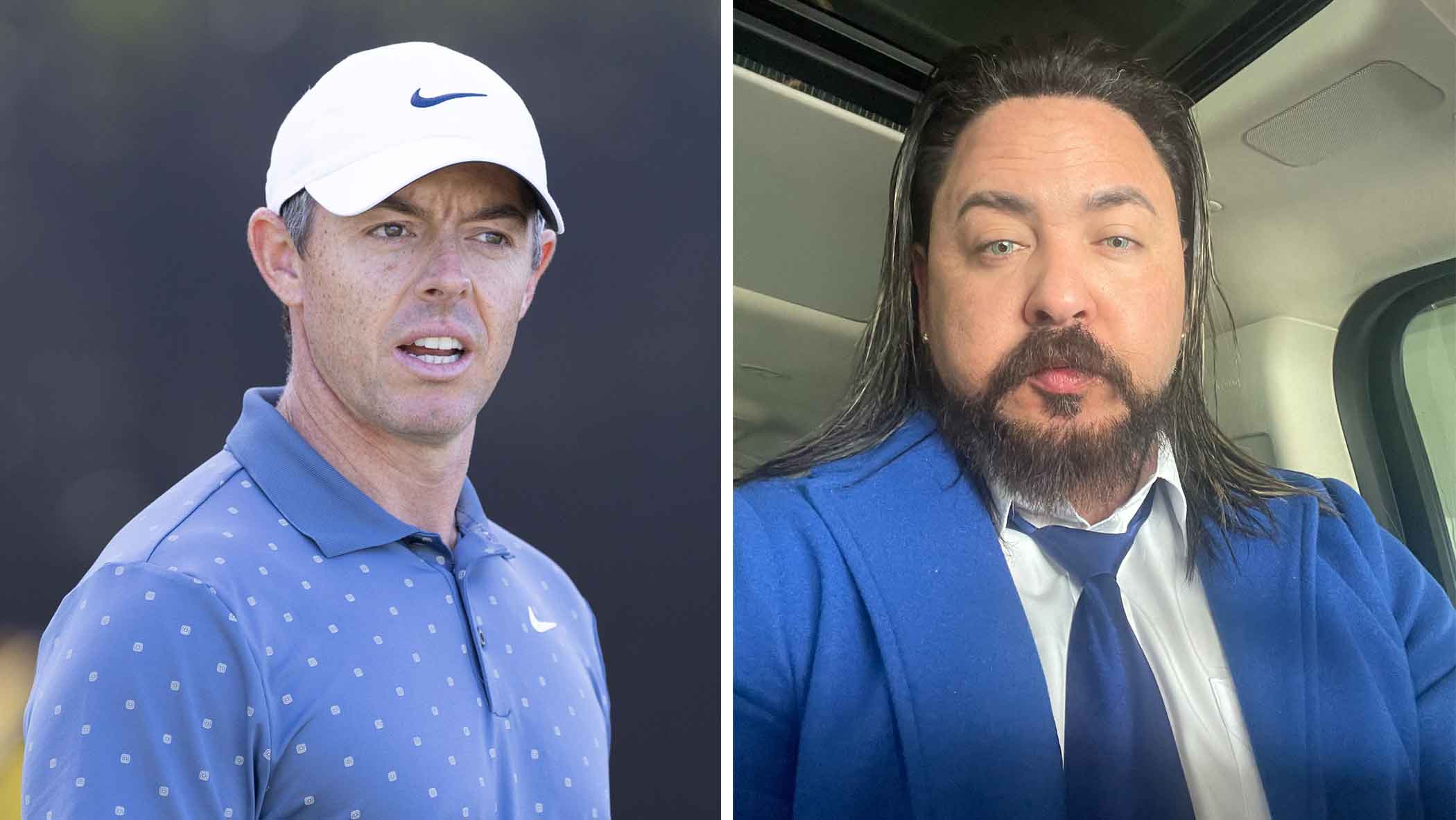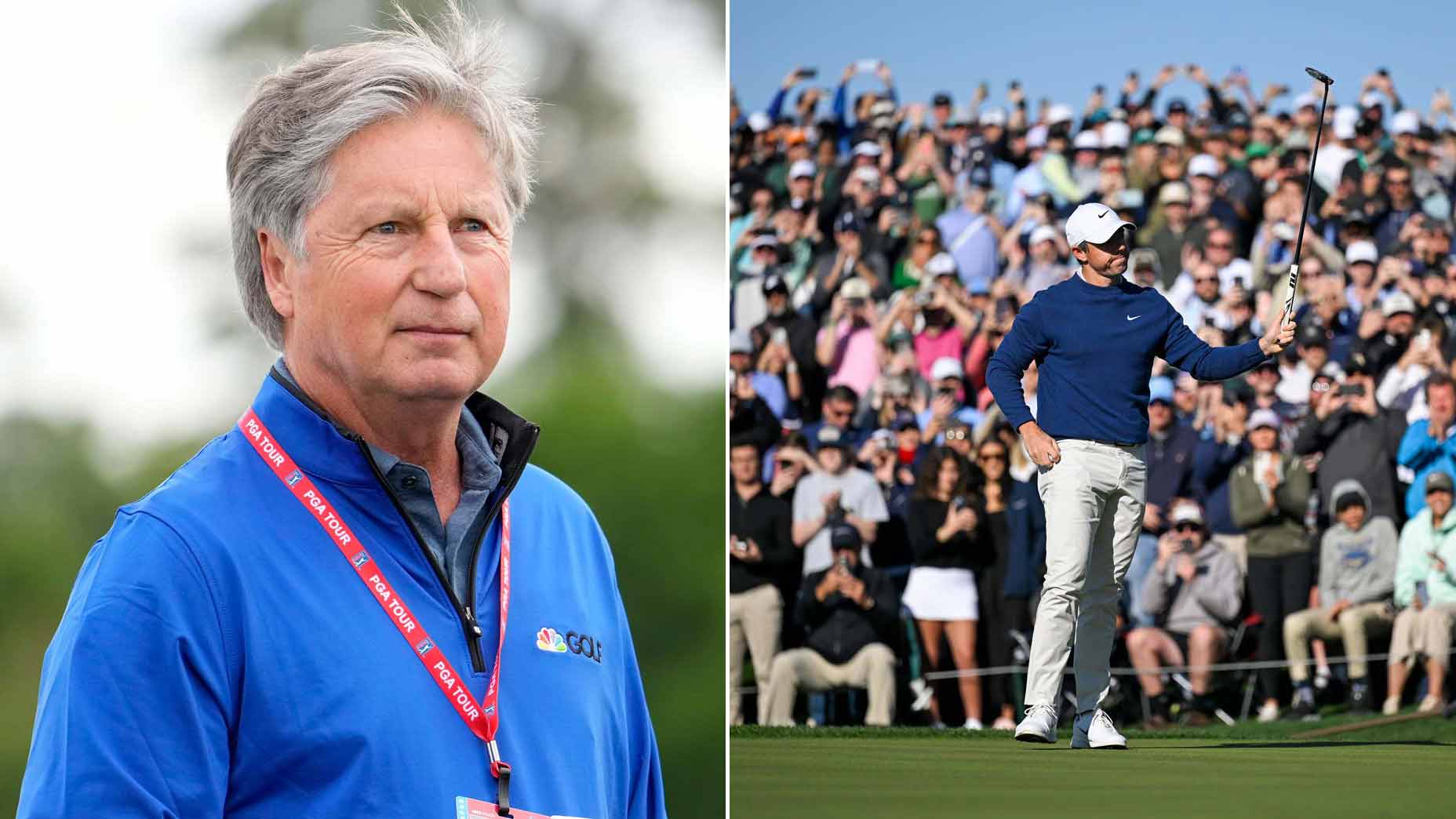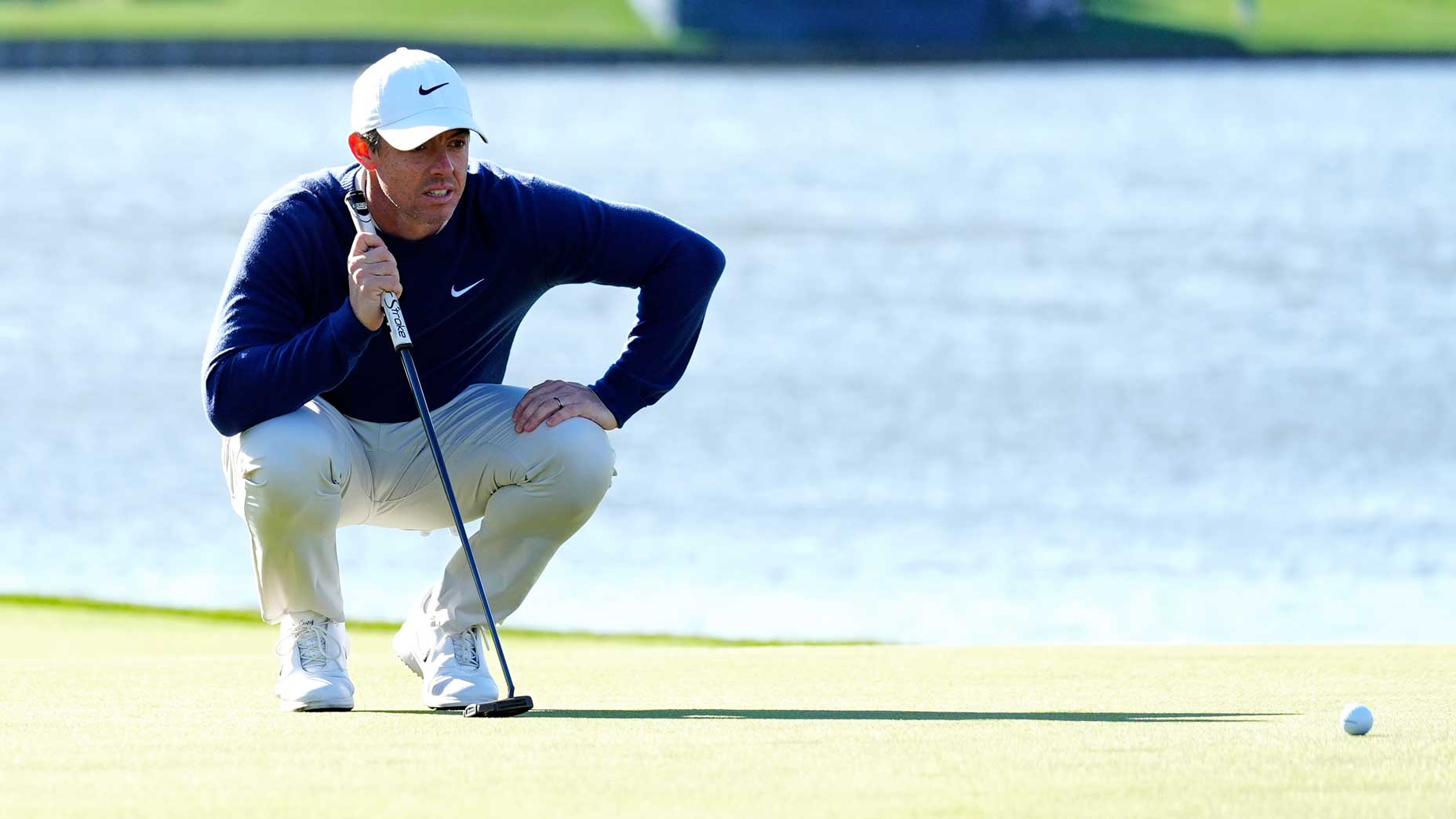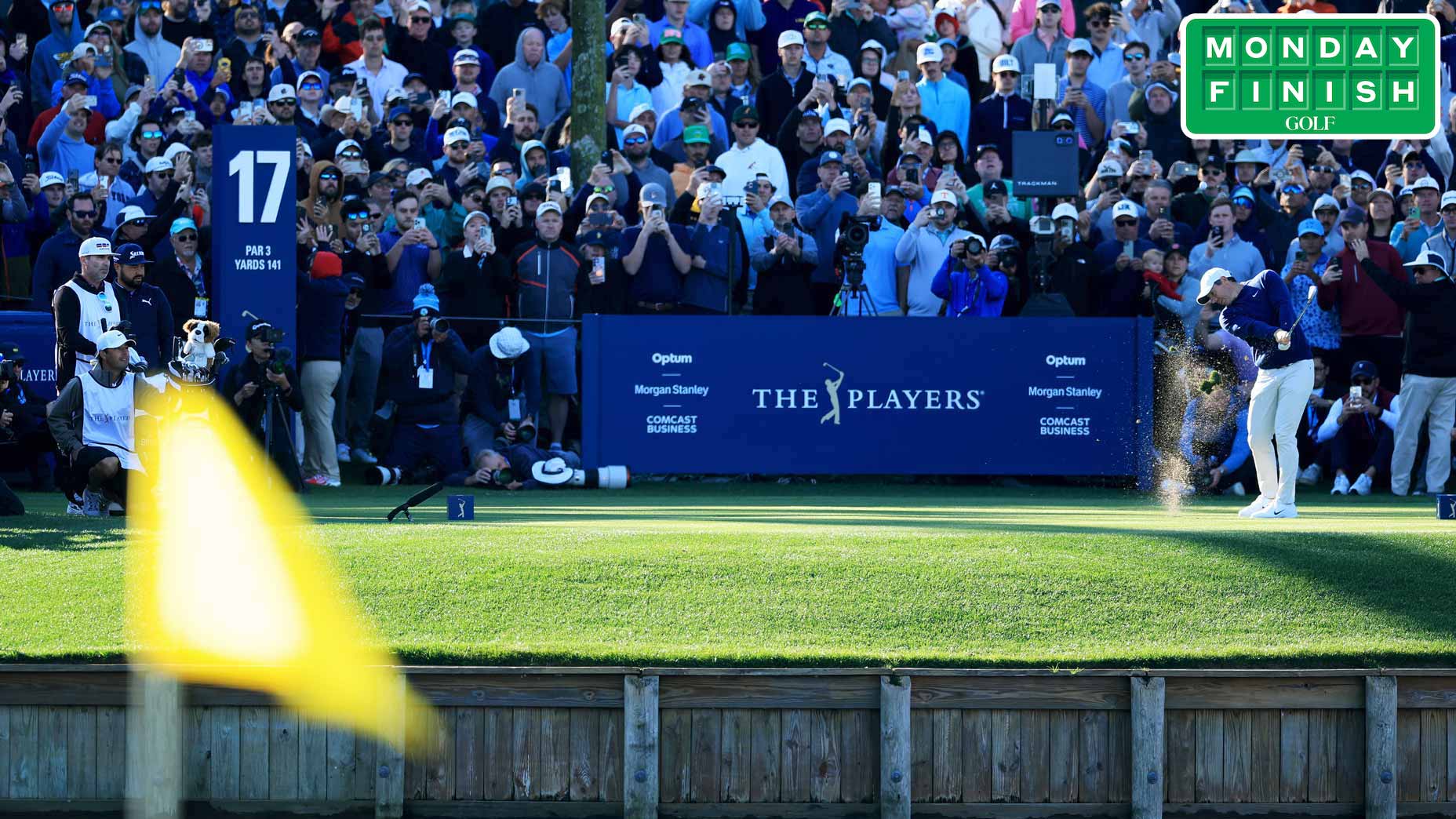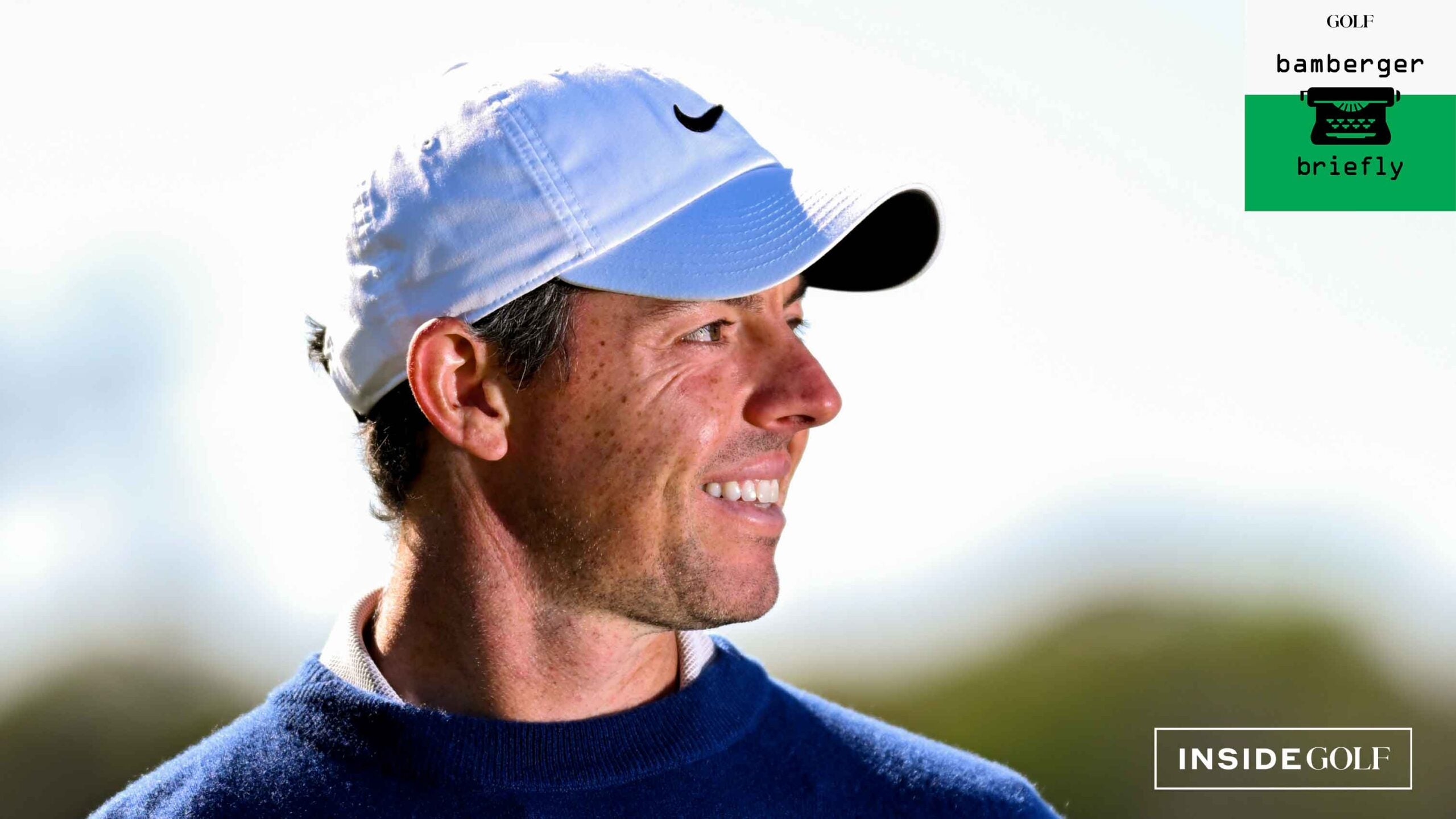PONTE VEDRA BEACH, Fla. — The people were starving.
Golf people tend to arrive early to their functions, so when the sleek glass doors at the PGA Tour’s chic headquarters opened at 6 p.m., golf’s glittering class — plus Joe LaCava — was ready to move on in, with the promise of a pre-ceremony hors d’oeuvres and, before the night was out, Joe’s boss being inducted into the World Golf Hall of Fame. That is, Tiger Woods his own self.
The folks in their finery were hungry to resume their public social lives after two years of pandemic restrictions. They were hungry to see Woods in person, because his public outings are far and few between. And they were hungry period, as the ratio of milling guests to circulating food trays was approximately 85 to 1.
David Feherty was your director of ceremonies, brouging his way through the commercial breaks. Yes, among other things, the Hall of Fame induction is a TV show.
Justin Thomas sat in the second row, behind Tiger.
PHOTOS: Tiger Woods and family celebrate his World Golf Hall of Fame inductionBy: Zephyr Melton
Tony Finau (in an elegant black suit) and Alayna Finau (in an elegant black dress) sat by themselves in a spillover section, on a second-floor balcony. Really, they had the best seats in the house. Space to themselves and the chance to take in the whole room.
There, on an aisle seat stage left, was the Hall of Famer Dennis Walters and his dog Augusta. And here, smack-dab in the middle of the house, was Fred Ridley, chairman of the Masters Tournament. Ten rows up and much closer to the stage was Julie Crenshaw, wife of two-time Masters champion Ben Crenshaw. Then, in the first row and beside his sister and mother, was Charlie Woods, son of five-time Masters champion Tiger Woods.
Maybe you remember Charlie marching to the Augusta National clubhouse, alongside his father, in a red-and-black Nike T-shirt, when Tiger won at Augusta in 2019. Over the course of the night, dozens of this-is-your-life clips and snaps for all the inductees were shown, that win among them. Father and son were flying.
You could see a hatted Marion Hollins, Jazz Era golf-course designer, making a black-and-white swing with a hickory-shafted driver.
You could see Susie Maxwell Berning, Oklahoma cowgirl who won three U.S. Opens, sitting high in a Western saddle.
You could see Tim Finchem, the PGA Tour commissioner all through the Woods years and founding father of the Presidents Cup, consorting with sitting presidents and First Tee kids.
Berning had the line of the night:
“And by the way, Tiger, of my three U.S. Opens, the total winnings was $16,000. I was wondering if we could swap checks. If not all, we could do one.”
Woods laughed. So did his girlfriend, Erica Herman, sitting to his right. And Finchem, sitting to his left. Her truth-to-power joke was a trenchant reminder that professional golfers play golf (library voice here, please) for money.
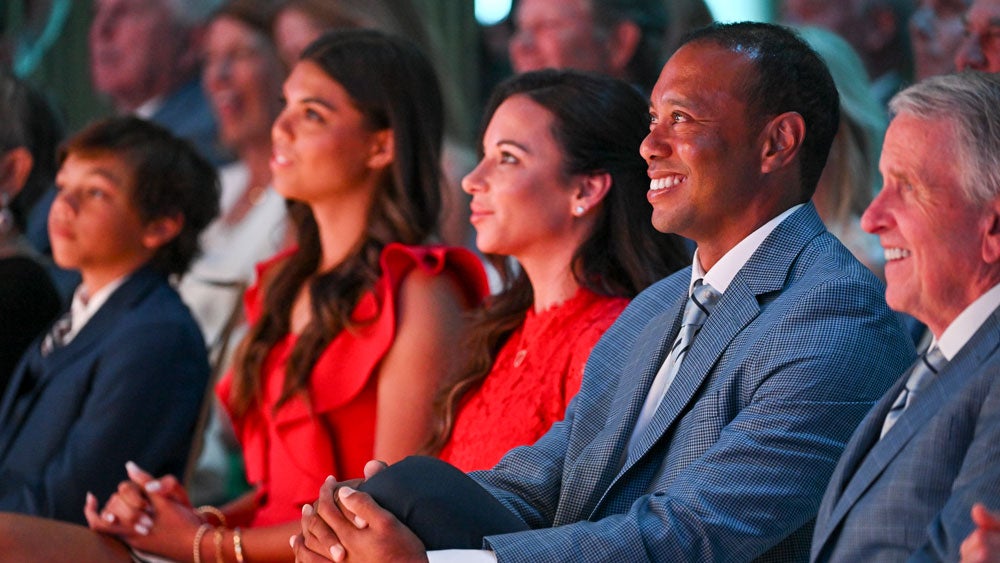
Woods won U.S. Opens in 2000, ’02 and ’08. His checks were for $800,000, $1 million and $1.3 million, respectively. The winner of this week’s Players Championship will earn $3.6 million.
It must pain Woods and Phil Mickelson and Bryson DeChambeau to not be playing this week. Woods, who is 46, has not said when he will play tournament golf again after a life-changing single-vehicle crash in Los Angeles 13 months ago.
Mickelson, 51, inducted into the World Golf Hall of Fame a decade ago, has not said when he will play tournament golf again in the wake of a series of incendiary remarks about his longtime professional home (the PGA Tour) and his possible future professional home, an international golf league funded by the Saudi ruling class.
DeChambeau, whose six-year career as a pro has been marked by double-take changes in his size, did not cite a specific reason for his withdrawal, although he has had various hand and hip injuries over the past year. He is 28, a winner of both the U.S. Amateur and a U.S. Open, and he is surely on his way to a Hall of Fame induction of his own, if his next five years is anything like his previous half-decade.
You do, under current Hall of Fame rules, have to be at least 45 to be inducted. It has gone from 40 to 50 to 45 in recent years. Woods, in his remarks, thanked Hall officials for lowering the age to 45. That’s what got him in, plus, you know, a few wins here and there. His induction was supposed to be last year but was postponed on account of Covid.
Tiger Woods finally wrote his own story — with help from his daughter SamBy: Dylan Dethier
Woods was introduced, charmingly and confidently, by his 14-year-old daughter, Sam. Sam Woods, already on the varsity soccer team at the Benjamin School, in South Florida, read her remarks, printed out on a single piece of paper, single-spaced and using all of one side and half of another. She reminded her listeners that the day before she was born her father had a putt, at the 2007 U.S. Open, at Oakmont, near Pittsburgh, to force a playoff. Instead, he flew to Orlando in time for Sam’s birth. “He may have lost that day, but he won the greatest gift of all,” she said. Oh, Sam Woods plays the violin, too. Who knew?
Her father closed out the night, more than three hours after it began. He was never more appealing. Wearing an ill-fitting gray-plaid sport coat — a Peter Millar number given to all the male World Golf Hall of Famers — Woods spoke without notes. He knows we know everything he did as a pro and in his final years as an amateur. The revolution was most certainly televised. In his remarks, he wisely took us to places we have never been, inside his childhood home and on the public Southern California courses where he first learned the game that eventually made him rich and likely more famous than he ever wanted to be.
The suggestion here is to watch it if you can. Woods speaks as he never has before and spends about 18 minutes doing it. He talked about playing golf at night, hunting for balata golf balls, putting for quarters. Public golf. His mom, driving. His dad, lecturing. When he talked about his childhood putting, Crenshaw leaned in.
Woods talked about being denied access to country-club locker-rooms as a kid golfer at junior tournaments, because “the color of my skin dictated that.” This was on an evening when Jay Monahan, the PGA Tour commissioner, talked about how golf needed to do more to make the game more inclusive, and when Renee Powell, 75, the second Black golfer on the LPGA and the daughter of a legendary Ohio golf-course owner, Bill Powell, received an award for Charlie Sifford, the pioneering Black PGA Tour player. Sam’s kid brother is named for Charlie Sifford.
Barred from the clubhouse, Woods said he would put his golf shoes on in the parking lot and pose two questions:
Watch the speech if you can. Woods speaks as he never has before and spends about 18 minutes doing it.
“Where was the first tee and what was the course record?”
Bubba Watson, watching from the second-floor balcony and wearing a white T-shirt, listened intently, two fingers over his lips.
“It was not complicated,” Woods said of his questions. He paused. The applause was polite.
He spoke of the modest circumstances in which he grew up, how his parents took out a second mortgage on their home, to finance their only child’s golfing ambitions.
This was spectacular:
“So without the sacrifices of mom, who took me to all those junior golf tournaments, and dad, who’s not here but who instilled in me this work ethic, to fight for what I believe in, to chase after my dreams, and that nothing’s ever going to be given to you, everything’s going to be earned.
“If you don’t go out there and put in the work, if you don’t go out and put in the effort — one, you’re not going to get the results. And two, and more importantly, you don’t deserve it. You need to earn it.”
You might consider writing that out by hand and taping it on the fridge.
He concluded the night by saying that he viewed his Hall of Fame induction not as an individual honor, but as a team one, made possible by his parents, his two children, his girlfriend, his coaches, his caddies, his friends. It was a nice and fitting moment.
But it was much earlier in his remarks, talking about his start in the game, that he said one of the most revealing things he has ever said:
“I had this burning desire to express myself through this game of golf.”
Through the years, his clubs talked, screamed, cursed and sang. They won’t do in the future what they did in the past. They got him in the Hall of Fame at age 46. In actual fact, Tiger Woods would have been a first-ballot Hall of Famer had he never hit a shot as a professional, had he stopped playing after his third U.S. Amateur title in 1996. But he didn’t, of course, do that. We all know what he did, a career and a life in golf unlike any before it.
Now comes the rest of it.
Michael Bamberger welcomes your comments at Michael.Bamberger@Golf.com
